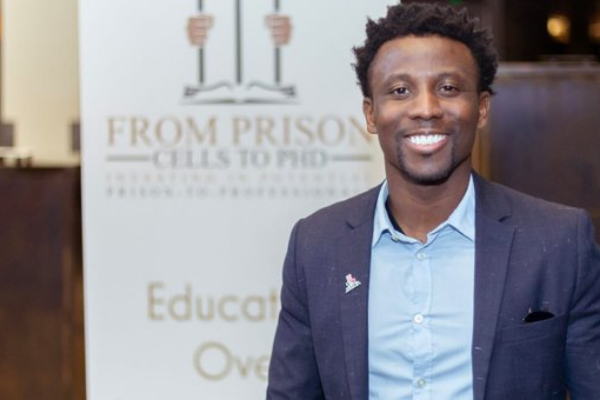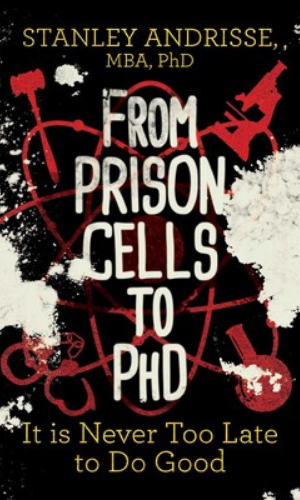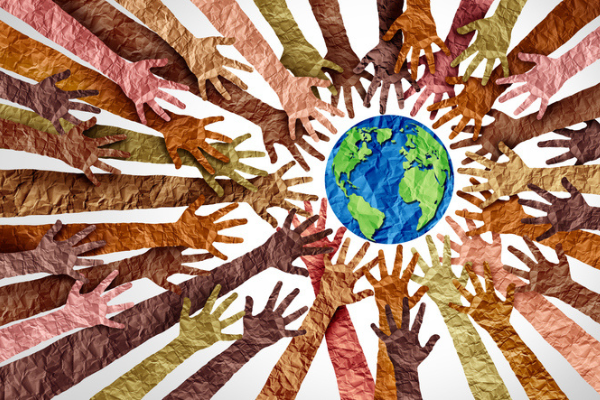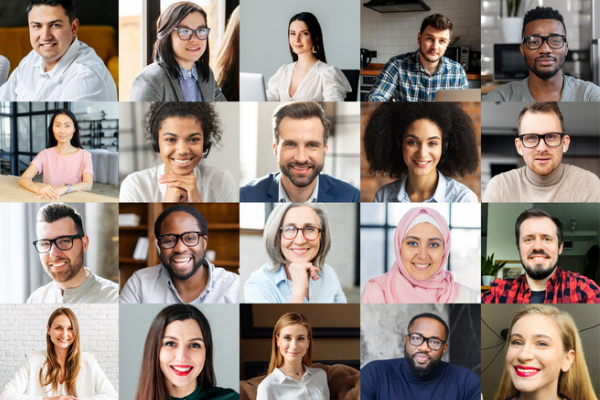By: Stanley Andrisse, Executive Director, Prison Cells To PhD (P2P)

What inspired you to start From Prison Cells To PhD (P2P)?
My experience with the criminal legal system and the barriers that I faced trying to enter the field of science and medicine inspired me to start P2P. My hope was to help inspire others with similar backgrounds to excel beyond what society and life circumstances have set to be the norm.
My path to science has been quite different than any other scientist or academic in my field of endocrinology and biomedicine. I am a formerly incarcerated person with three felony convictions, sentenced to ten years in prison as a prior and persistent career criminal. I was once told by a prosecuting attorney that I had NO hope for change. I am now, Dr. Stanley Andrisse, endocrinologist scientist and professor at Howard University College of Medicine, former faculty at Johns Hopkins Medicine, affiliate at Georgetown Medical Center and my newest title is Visiting Research at Imperial College of London. I’d say that I may have changed just a little bit.
If interested, learn more about my journey by getting a copy of my recently released book, From Prison Cells to PhD: It Is Never Too Late To Do Good.
I am a Board member of the Formerly Incarcerated College Graduates Network (FICGN), that is connected to thousands of formerly incarcerated college graduates and have the pulse for these types of things. To my knowledge and FICGN's knowledge, I am the only black male openly formerly incarcerated person who is a medical school professor.
My dad and I had fallen off as I was making those poor decisions that led to my incarceration. My dad’s health plummeted while I was in prison. Piece by piece, they amputated his lower limbs up to his torso. Before I could reconcile our relationship, he fell into a coma and died from type 2 diabetes. This was emotionally devastating. But, I used that devastation as inspiration. He remains my inspiration.
In so many different ways, he was the influence for me to thrive, and to build the resilience to become this different person and this better person. Because in a way, I felt that he had been trying to keep me away from making these types of decisions, in the phrase that he was telling me, “Il ne jamn twa ta po fe bien.” Translated as “It’s never too late to do good.”
In conversations with my dad before I went to prison, he tried to get me to see the positive impact I could make on the world and to convince me that it wasn’t too late for me to make changes in my life. So very much he was the driving force behind me wanting to just change to change to become a better person that makes better decisions. And in a very real way, his condition was what drove me to my current career path.
You wrote that “education was transformative” to you. Can you elaborate on how education transformed you?
Higher education is transformative for people impacted by the system. It goes beyond the actual material learning and degree attainment. The college experience is a broadening of horizons. It is an introduction to new people, perspectives, and places. For many people in the system, they have been physically and psychologically boxed in their environments and thinking, respectively. Higher education facilitates a metamorphosis from an old way of viewing the world to a new way.
Higher education also served as a therapeutic tool healing the ills of incarceration for me. By diving deep into my studies, I was able to calm the post-traumatic stress disorder (PTSD) I had been experiencing. I was able to reinvent myself. I was now an academic scholar.
Tell us about why you became interested in biomedical research that investigates the intersecting pathways of insulin resistance?
Dealing with death and disease is difficult at any time. But dealing with it while you’re locked in a cage was very emotionally challenging. It was really wanting to know how this disease took this person that I so deeply cared for, from being this strong fatherly figure, that I saw him as, to basically kind of eating away at him.
I wasn’t driven to be at the bedside, I was driven to understand what was going on molecularly inside the cell of a person with type 2 diabetes. And so, I began studying diabetes. I read my first scientific article on diabetes while locked in my cell. And I was fortunate to have this mentor in my life, who happened to be a biomedical scientist, not in diabetes, but nonetheless he began learning some of the intricacies of diabetes so that he could translate them to me in a way that was understandable. Over the course of weeks and months, we’d essentially have scientific journal clubs via brief prison phone calls and mail. And that’s where I first started learning about the intricacies of the human cell, and how diabetes affected and caused dysfunction in the human cell.
What is the percentage of P2P scholars who enter Science, Technology, Engineering, Mathematics (STEM) fields and how can the chemical industry help P2P?
Over 400 currently and formerly incarcerated men and women apply to P2P on a yearly basis. About 100 people start the program each year and about 80 of those complete our program. We call the participants of our program scholars. Nearly 40% of the 400 applicants are hoping to pursue careers in STEM and roughly 70% of the 80 people per year who complete our program move into STEM careers.
The chemistry industry can help P2P by opening their doors to people with convictions, and by providing true access and opportunities. This requires things like being featured in this publication. But it must go beyond talk. It requires putting money and resources into initiatives that help people with convictions. Starting fellowships directed at recruiting men and women who have been impacted by the legal system. Supporting mentoring networks for currently and formerly incarcerated people to help them find and believe in their science identity. Helping to put formerly incarcerated leaders in positions of power and resources so that they can have bigger impacts on their community. The social enterprise branch of my organization, P2P Consulting, works with organizations to design and implement anti-racist recruitment, hiring, and retention practices focused on supporting people with convictions. I encourage your community to reach out to us for assistance in these efforts.
How was the P2P leadership team selected?
Over 85% of the P2P team (30+ paid team members, 20 board members, and hundreds of volunteers) are formerly incarcerated (70%) or directly impacted (85%) by having someone who has been incarcerated for any period of time (formerly incarcerated) or has had a close family member who has been incarcerated for any period of time. P2P believes that “Those closest to the problem are closest to the solution.” – Glenn Martin, founder of Just Leadership USA. We want to bring power and resources to people with convictions.
Tell us about the work the P2P Ambassadors do
The P2P Ambassadors were created to spread the mission of P2P and to help implement satellite P2P sites in cities across the nation.
P2P is a partner in the National Science Foundation (NSF) funded initiative called STEM Opportunities in Prison Settings (STEM-OPS). STEM-OPS will soon be recruiting people to Working Groups, one of which will be focused on creating mentoring networks for formerly incarcerated scholars. We encourage to you join or learn more at the NSF and EDC websites.
What is your vision for P2P in the next five years?
P2P was founded in 2017. Every year since its existence it has grown 4-5 fold in the number of people it helps. We help people rewrite their stories. We have people change the narrative in their personal lives and in the views of the community towards people with convictions. We hope to continue growing in the number of people we impact. We currently have team members or scholars in over 30 states. In five years, we hope to have representation in all 50 states and internationally.
Tell us about the advocacy efforts of P2P
We are dedicated to promoting and advocating for higher education for currently and formerly incarcerated men and women. The UNLOCK Higher Ed Coalition is a group of stakeholders interested in policy solutions to increase educational access for individuals with criminal convictions.
Here are the P2P 2020-21 Advocacy Priorities:
- Restore Pell Grant eligibility for all incarcerated students.
- Remove Q. 23 from the Free Application for Federal Student Aid (FAFSA) to eliminate the relationship between federal student aid and drug convictions.
- Remove questions regarding criminal history from college admission applications.
- Support the Office of Correctional Education to standardize educational programming within the Bureau of Prisons through vetting and quality control oversight.
After four years of working on the issue, we accomplished #1 and #2 in December 2020. We are now working with the US Department of Education for implementation of #1 and #2. As of September 2021, I have been invited to be a negotiator on the US DOE's Affordability and Student Loans Committee. It is important that formerly incarcerated people have a seat at the table.
We are working with UNLOCK Higher Education on #3, where we are working with over 20 states to Ban the Box on College Applications (State and Federal).
This article has been edited for length and clarity. The opinions expressed in this article are the author's own and do not necessarily reflect the view of their employer or the American Chemical Society.
Copyright 2022 American Chemical Society (All Rights Reserved)






